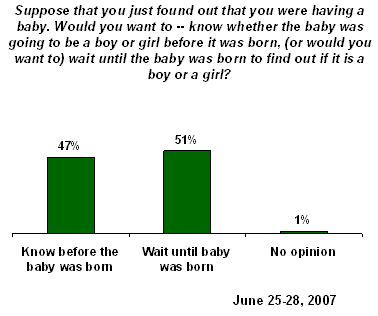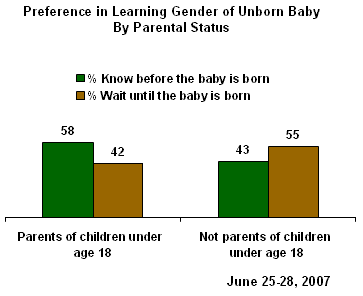GALLUP NEWS SERVICE
PRINCETON, NJ -- If you found out that you were having a baby, would you want to know whether it was a boy or girl before it was born, or would you want to wait until birth to find out? That may be a difficult question to answer, and one that many couples have to answer when they discover they are having a child.
A recent Gallup Panel poll finds the public roughly divided as to whether or not they would want to know the sex of their baby beforehand. More than 6 in 10 18- to 34-year-old Americans and women under age 50 say they would like to find out the baby's sex before it is born. A majority of parents with young children would also like to find out before birth. By comparison, most older Americans (aged 50 and older), as well as Catholics and Americans who frequently attend religious services would prefer to be surprised.
The June 25-28, 2007, Gallup Panel poll asked Americans to answer a hypothetical question about learning the sex of their child if they "just found out" that they were having a baby. The public is essentially divided in its views -- 51% of Americans say they would wait until the baby is born, while 47% say they would like to know beforehand.

Majority of Younger Americans Want to Know Sex Before Baby Is Born
Roughly two in three younger adults, and most women under age 50, tell Gallup that they would like to know whether they are having a boy or a girl before the baby is born.
|
Preference in Learning Gender of Unborn Baby by Gender and Age
|
||
|
Know before the baby was born |
Wait until the baby was born |
|
|
% |
% |
|
|
Gender |
|
|
|
Men |
45 |
54 |
|
Women |
49 |
49 |
|
|
|
|
|
Age |
|
|
|
18- to 34-year-olds |
66 |
34 |
|
35- to 49-year-olds |
48 |
51 |
|
50 years old and older |
32 |
65 |
|
|
|
|
|
Gender/Age |
|
|
|
Men, aged 18-49 |
54 |
45 |
|
Men, 50 years old and older |
31 |
66 |
|
Women, aged 18-49 |
61 |
39 |
|
Women, 50 years old and older |
33 |
64 |
Both men and women are roughly divided in their preference for learning the sex of a baby before it is born or waiting until after it is born.
Sixty-six percent of Americans between the ages of 18 and 34 say they would like to know whether they are having a boy or a girl before the baby is born. This compares with 48% of those between the ages of 35 and 49, and just 32% of those aged 50 and older. These age variations may be due to the fact that identifying a baby's sex in utero was not an option when most older Americans had children -- the technology simply didn't exist.
Among the various age-by-gender groups, 61% of women under age 50 say they would like to know the baby's sex before birth, slightly higher than the 54% of men in this age group. The majority of both men and women aged 50 and older prefer waiting until the baby is born to find out whether the baby is a boy or a girl.
More than 6 in 10 Catholics Prefer the Surprise
Religion is also related to Americans' views about finding out the sex of a baby before it is born.
A solid majority of Catholics, 63%, say they would want to wait until the baby's birth to find out whether it is a boy or a girl, while 36% would like to know before then. Protestants, by comparison, are roughly divided -- 51% prefer to wait, while 48% prefer to find out before birth. A majority (57%) of those with no religious affiliation would want to find out the sex of the baby before birth.
A majority of Americans who attend religious services at least monthly say they would wait until the baby is born to find out its gender. Among those who seldom or never go to church, there is a slight preference for learning the baby's sex before it is born.
|
Preference in Learning Gender of Unborn Baby
|
||
|
Know before the baby was born |
Wait until the baby was born |
|
|
% |
% |
|
|
Religious Preference |
|
|
|
Protestant |
48 |
51 |
|
Catholic |
36 |
63 |
|
No religion |
57 |
41 |
|
|
|
|
|
Church Attendance |
|
|
|
At least monthly |
42 |
56 |
|
Seldom/never |
52 |
46 |
Parents of Young Children Want to Know Baby's Gender Before Birth
Parents of young children are much more likely than those who are not to say that they want to know the baby's sex before it is born.

Fifty-eight percent of parents of children under age 18 say they would like to know the sex of the baby before it is born, while 42% would prefer to wait. The results are essentially the reverse among those who are not parents of children this age -- 55% would prefer to wait, 43% would like to know earlier.
Survey Results
Results for this panel study are based on telephone interviews with 1,014 national adults, aged 18 and older, conducted June 25-28, 2007. Respondents were drawn from Gallup's household panel, which was originally recruited through random selection methods. The final sample is weighted so it is representative of U.S. adults nationwide. For results based on the total sample of national adults, one can say with 95% confidence that the maximum margin of sampling error is ±4 percentage points. In addition to sampling error, question wording and practical difficulties in conducting surveys can introduce error or bias into the findings of public opinion polls.